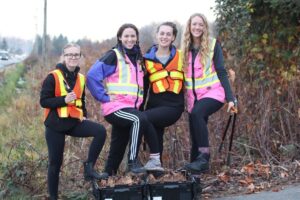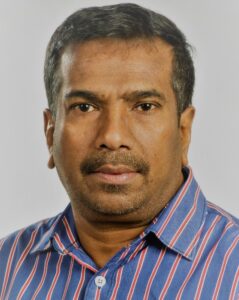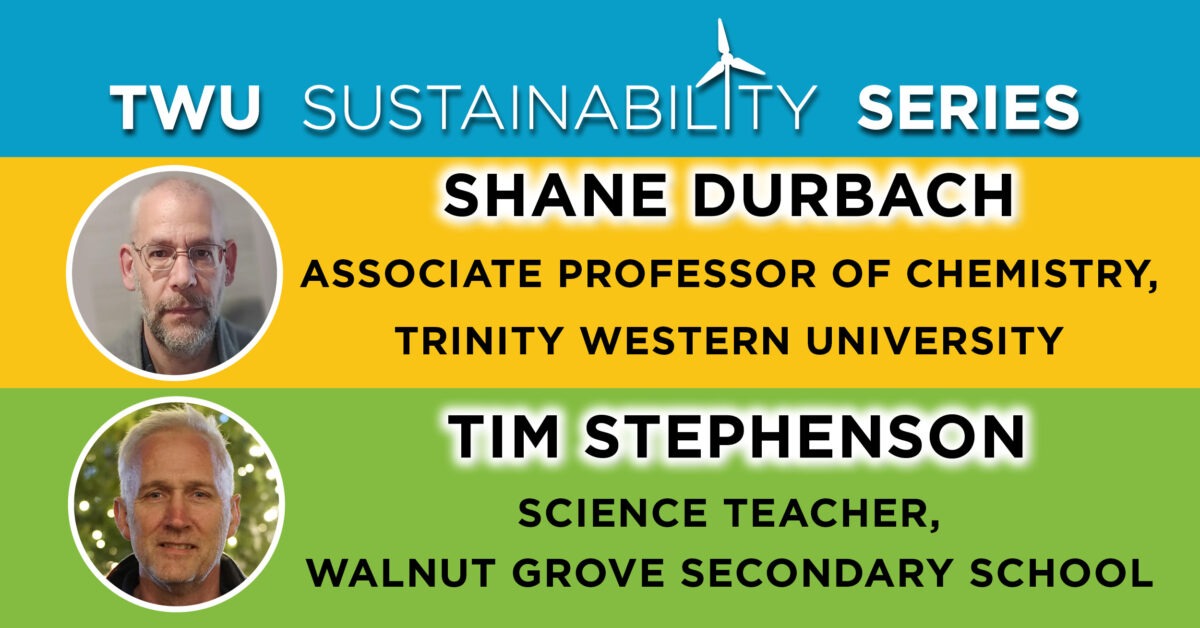FREE PUBLIC EVENT: Trinity Western University’s Faculty of Natural and Applied Sciences and CSCA’s Vancouver chapter present an in-person & online seminar with Shane Durbach (Associate Professor of Chemistry, Trinity Western University) and Tim Stephenson (Science Teacher, Walnut Grove Secondary School). This event is funded by a Supporting Structures grant from Scholarship & Christianity In Oxford) and CSCA.
Find more events in Vancouver, BC
 To be followed by Optional Community Cleanup (inc. Lunch)
To be followed by Optional Community Cleanup (inc. Lunch)
Following the talks in the DeVries Auditorium, lunch will be served in the Pavilion (located across from the Mattson Center, precise location here) at 12 noon for those who would like to volunteer for a community cleanup. This cleanup will take place along Glover Road from 1 to 3 pm, coordinated with the Township of Langley. Living sustainability goes beyond just talking, so here’s a chance for you to walk the talk!
Note!
Note: As per BC public health order, vaccination status will be verified at the door for the presentation portion of the event (10am-12pm PDT) and proper face-coverings are required to be worn by all for the entire event, except when actively eating. (These health orders do not apply to the outdoor lunch and community cleanup mentioned above.)
Plastic Particles of Hope
This seminar features two presentations. We will hear from Shane Durbach on plastic pollution and from Tim Stephenson on climate change education.
Shane Durbach on Plastic Pollution
Plastic pollution, estimated to reach 16 million tons by 2025, is a pervasive global problem that impacts marine life by various means: physical entanglement, ingestion, bio-magnification of chemical pollutants, etc. Single-use plastics, which are derived from non-renewable petroleum—e.g. grocery bags, drinking bottles, yogurt cups, etc.—are major contributors to plastic pollution due to their limited biodegradability. For instance, a recent report indicated that less than 11% of plastics are actually recycled in Canada, while close to 90% of single-use plastics are incinerated and/or disposed of in landfills, oceans, etc. So along with the development of renewable biodegradable plastics, nearer-term strategies are needed to find alternative uses for single-use plastics. This presentation will report on research being conducted by TWU in collaboration with the University of Regina to make composite pipe-liners from single-use plastics to prevent metal pipe corrosion.
Shane Durbach (Ph.D., Chemistry) is Associate Professor in the Department of Chemistry, Faculty of Natural and Applied Sciences, of Trinity Western University. His research interests include developing strategies for synthesizing shaped carbon nanomaterials from templates (i.e. soft, easy to remove or functional inorganic compounds) and various waste carbon sources (e.g. single-use waste plastics) for potential application as fillers in low-cost composites (for use in building materials) or as photocatalysts (e.g. water purification).

Jacob Muthu
(Ph.D., P.Eng)
Although this work will be presented by Shane, it is a collaborative effort with Jacob Muthu (Ph.D., P.Eng), Assistant Professor of Petroleum Systems Engineering at the University of Regina. His research interests include Nano and hybrid composites, Composite repairs, Piping engineering and materials, Fretting fatigue and fatigue analysis, Slam load analysis of rigid guided mineshaft conveyances, Finite element analysis, Multiscale modeling and simulation.
Tim Stephenson on Climate Change Education
Tim has been a teacher in Langley for almost thirty years. In that time he has earned a reputation for two things: being the only astronomy teacher and being a strong advocate for climate education. In 2017, he delivered a TEDx talk that focused on solutions to climate change. His conclusion was that the best solution is education. Just as the Moon landing in 1969 was a monumental event that galvanized the world, so is today’s climate crisis—something Tim refers to as the “modern-day Moonshot.” But in order to care, people need to know. As such, education is the key to a sustainable planet. Tim will also be highlighting some of the ongoing research he and his students are conducting at Walnut Grove Secondary School. This includes the story of their plastic grinding machines, data from some of their experiments on melting the plastic and the way the plastic degrades over time.
